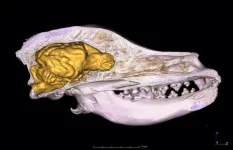(Press-News.org) The UK and the European Union should follow Australia’s lead and ban the kitchen worktop favourite and cause of irreversible and rapidly progressive lung disease—artificial stone siliicosis—urge researchers in an editorial, published online in Occupational & Environmental Medicine.
And until a ban comes into force, all possible control measures should be legally enforced to minimise workers’ exposure to the harmful crystalline silica dust generated during its manufacture and fitting, insist the authors.
Artificial stone (also known as engineered stone) is widely used for surfaces in kitchens and bathrooms as a low-cost alternative marble and granite. Although mainly used for kitchen countertops, it is also used for vanity units, walls, and flooring.
Artificial stone products have become so popular that the global market for them is estimated to be worth around US$25 billion a year, point out the authors.
Prompted by the rapid emergence of the irreversible progressive lung disease, artificial stone silicosis, among people working with artificial stone, Australia has banned its use, supply, and manufacture since July this year.
“This far-reaching policy is the first of its kind in the world and is similar to the bans on the use of asbestos and asbestos products that are in place in many countries worldwide (currently 70),” say the authors.
Eleven cases of artificial stone silicosis have now been reported in the UK.
While alternatives, such as marble and granite, also generate fine crystalline silica dust when produced and used, they have a much lower crystalline silica content and are probably better regulated, so have not been associated with a heightened risk of silicosis, say the authors.
“Regulators have often resorted to banning chemicals or products in workplaces to protect the health of workers,” note the authors….”And it is certainly the most appropriate strategy when control of exposure in workplaces is difficult to achieve.”
But there is some resistance to an outright ban, note the authors, citing an article in the official magazine of the British Occupational Hygiene Society (BOHS). This suggested that the risks presented by engineered stone could be adequately controlled by applying the principles of good occupational hygiene control practice.
“We disagree, mainly because of the nature of the hazard presented by these materials and the difficulty in ensuring all employers and workers understand the risks and abide by the necessary control measures,” argue the authors.
“Furthermore, according to the hierarchy of control, elimination and/or substitution with less hazardous materials is most effective when reducing risks. Early evidence from Australia suggests that the ban has already resulted in innovations by the sector to develop new products with no or very low silica content,” they point out.
The authors support the introduction of a phased ban, which could work well in the UK and Europe, they suggest. “For example, there could be an initial ban on products containing more than 30% crystalline silica, moving to a ban on more than 5% after 5 years.”
A UK ban could be achieved by amending the Control of Substances Hazardous to Health (COSHH) Regulations, they suggest.
But stronger preventive action is needed in the interim, they insist. “In the meantime, all possible control measures should be taken to keep exposures to [respirable crystalline silica] as low as possible.
“We believe that this proposal is proportionate and would protect the health of European workers and other workers from across the globe, while encouraging the industry to continue to develop safer products.”
END
Follow Australia’s lead and ban artificial stone, researchers urge European governments
Until then, adopt all possible control measures to minimise exposure to harmful silica dust
2024-08-07
ELSE PRESS RELEASES FROM THIS DATE:
Reducing child poverty in England would significantly boost child health and narrow health inequalities
2024-08-07
Renewed efforts to reduce child poverty in England between now and 2033, such as removing the 2-child limit on child benefit, would significantly boost several aspects of child health and narrow health inequalities across the country, finds research published online in the Journal of Epidemiology & Community Health.
Tackling it would substantially cut the number of infant deaths and children in care, as well as rates of childhood nutritional anaemia and emergency admissions, with the most deprived regions, especially ...
Cut ties with Coca Cola in interests of athletes, spectators, and the planet, IOC urged
2024-08-07
The International Olympic Committee (IOC) should cut its ties with Coca Cola in the best interests of athletes, spectators, and the planet, urge Trish Cotter and Sandra Mullin of the international public health organisation, Vital Strategies, in an editorial to be published shortly in the open access journal BMJ Global Health.*
The company’s sponsorship forces athletes to implicitly endorse unhealthy sugary drinks and provides Coca Cola with elite access to political and corporate leaders to exert its influence, insist the authors.
Coca Cola has sponsored the Olympic Games for almost 100 years, they note. And there’s ...
Bloomberg Philanthropies makes founding gift to Xavier Ochsner College of Medicine
2024-08-07
Today, Bloomberg Philanthropies announced a gift of $5 million in seed funding to support the creation of the Xavier Ochsner College of Medicine (XOCOM), a newly established medical school in New Orleans founded by Xavier University of Louisiana and Ochsner Health.
Earlier this year, Xavier University of Louisiana, a historically Black college and university (HBCU) with a strong track record of sending graduates into the medical field, and Ochsner Health, the Gulf South’s leading not-for-profit health system with a long academic ...
Domestication causes smaller brian size in dogs than in the wolf, but such an evolutionary change is not unusual in wild animals
2024-08-07
A recent study by László Zsolt Garamszegi from the Institute of Ecology and Botany, Centre for Ecological Research, Hungary, and Niclas Kolm from the Department of Zoology, Stockholm University, Sweden, challenges the long-held notion that domestication is the primary driver of reduced brain size in domesticated animals, specifically dogs. The study employs a phylogenetic comparative method to analyze whether the domesticated dog (Canis familiaris) exhibits a uniquely small brain relative to its body size compared to other canid species.
The prevailing belief has been that domestication leads to a significant ...
Gestational diabetes does not increase risk of breast cancer, large Danish study finds
2024-08-07
*Note this is an early release from the Annual Meeting of the European Association of the Study of Diabetes (EASD 2024, Madrid, 9-13 September). Please credit the meeting if using this material*
Women who develop gestational diabetes are not more likely to go on to be diagnosed with breast cancer, according to a study of almost three-quarters of a million mothers to be presented at this year’s Annual Meeting of the European Association for the Study of Diabetes (EASD) (Madrid, 9-13 September).
Gestational diabetes, a type of diabetes that can develop during ...
Chemical and nutritional profile of fruit, vegetables and co-products to improve human health
2024-08-06
New studies emphasize the vital role of fruits, vegetables, and their co-products in boosting human health and life expectancy. Packed with minerals, vitamins, and dietary fiber, these foods help prevent chronic diseases. Antioxidants in fruits and vegetables, such as vitamins and carotenoids, combat harmful free radicals.
To get more information and to contribute to the research, visit: bit.ly/46zTKFX
Combining various fruits like oranges, apples, grapes, and blueberries enhances antioxidant effects. Diets ...
Attitudes such as distrust of government can cause swine farmers to resist animal biosecurity: UVM study finds
2024-08-06
A new University of Vermont study published today in Nature: Scientific Reports examines the social and psychological aspects of farmers’ decisions about whether or not to implement biosecurity measures on pig farms. This is the first study to look at human behavior in biosecurity adoption among swine producers.
Through survey data and simulations, the scientists found that it is largely farmers’ attitudes, which have the biggest impact on farmers’ decision-making strategies regarding implementing farm biosecurity. Farmer’s attitudes ...
Scientists reach consensus for fasting terminology
2024-08-06
Dr. Eric Ravussin of Pennington Biomedical Research Center in Baton Rouge was one of 38 scientists from five continents to present the first international consensus on fasting terminology and key definitions. Published in Cell Metabolism, the recent study reflects the increasing popularity of diets tied to fasting and a significant increase in scientific studies of fasting. While the application of fasting is rapidly growing, there was previously no globally established terminology.
The panel was the first to bring ...
C-Path welcomes new advisory members to Alpha-1 Antitrypsin Deficiency consortium
2024-08-06
TUCSON, Ariz., August 6, 2024 — Critical Path Institute’s (C-Path) Critical Path for Alpha-1 Antitrypsin Deficiency (CPA-1) consortium today announced the addition of several key advisory members. The new members, recognized experts in their respective fields and patient advocacy organizations, will contribute their significant expertise to the consortium’s mission to accelerate drug development for Alpha-1 Antitrypsin Deficiency (AATD), a rare genetic disorder.
Joining the consortium are:
Alpha-1 Foundation
COPD Foundation
Global ...
Drug bypasses suppressive immune cells to unleash immunotherapy
2024-08-06
By recruiting the immune system to combat tumor cells, immunotherapy has improved survival rates, offering hope to millions of cancer patients. However, only about one in five people responds favorably to these treatments.
With a goal of understanding and addressing immunotherapy’s limitations, researchers at Washington University School of Medicine in St Louis have found that the immune system can be its own worst enemy in the fight against cancer. In a new study in mice, a subset of immune cells – type 1 regulatory T cells, or Tr1 cells – did its normal job of preventing the immune system from overreacting but did so while inadvertently restraining immunotherapy’s ...
LAST 30 PRESS RELEASES:
Scientists discover “bacterial constipation,” a new disease caused by gut-drying bacteria
DGIST identifies “magic blueprint” for converting carbon dioxide into resources through atom-level catalyst design
COVID-19 vaccination during pregnancy may help prevent preeclampsia
Menopausal hormone therapy not linked to increased risk of death
Chronic shortage of family doctors in England, reveals BMJ analysis
Booster jabs reduce the risks of COVID-19 deaths, study finds
Screening increases survival rate for stage IV breast cancer by 60%
ACC announces inaugural fellow for the Thad and Gerry Waites Rural Cardiovascular Research Fellowship
University of Oklahoma researchers develop durable hybrid materials for faster radiation detection
Medicaid disenrollment spikes at age 19, study finds
Turning agricultural waste into advanced materials: Review highlights how torrefaction could power a sustainable carbon future
New study warns emerging pollutants in livestock and aquaculture waste may threaten ecosystems and public health
Integrated rice–aquatic farming systems may hold the key to smarter nitrogen use and lower agricultural emissions
Hope for global banana farming in genetic discovery
Mirror image pheromones help beetles swipe right
Prenatal lead exposure related to worse cognitive function in adults
Research alert: Understanding substance use across the full spectrum of sexual identity
Pekingese, Shih Tzu and Staffordshire Bull Terrier among twelve dog breeds at risk of serious breathing condition
Selected dog breeds with most breathing trouble identified in new study
Interplay of class and gender may influence social judgments differently between cultures
Pollen counts can be predicted by machine learning models using meteorological data with more than 80% accuracy even a week ahead, for both grass and birch tree pollen, which could be key in effective
Rewriting our understanding of early hominin dispersal to Eurasia
Rising simultaneous wildfire risk compromises international firefighting efforts
Honey bee "dance floors" can be accurately located with a new method, mapping where in the hive forager bees perform waggle dances to signal the location of pollen and nectar for their nestmates
Exercise and nutritional drinks can reduce the need for care in dementia
Michelson Medical Research Foundation awards $750,000 to rising immunology leaders
SfN announces Early Career Policy Ambassadors Class of 2026
Spiritual practices strongly associated with reduced risk for hazardous alcohol and drug use
Novel vaccine protects against C. diff disease and recurrence
An “electrical” circadian clock balances growth between shoots and roots
[Press-News.org] Follow Australia’s lead and ban artificial stone, researchers urge European governmentsUntil then, adopt all possible control measures to minimise exposure to harmful silica dust




